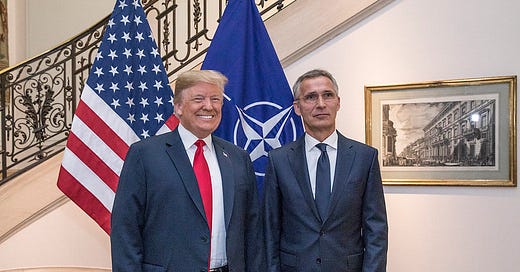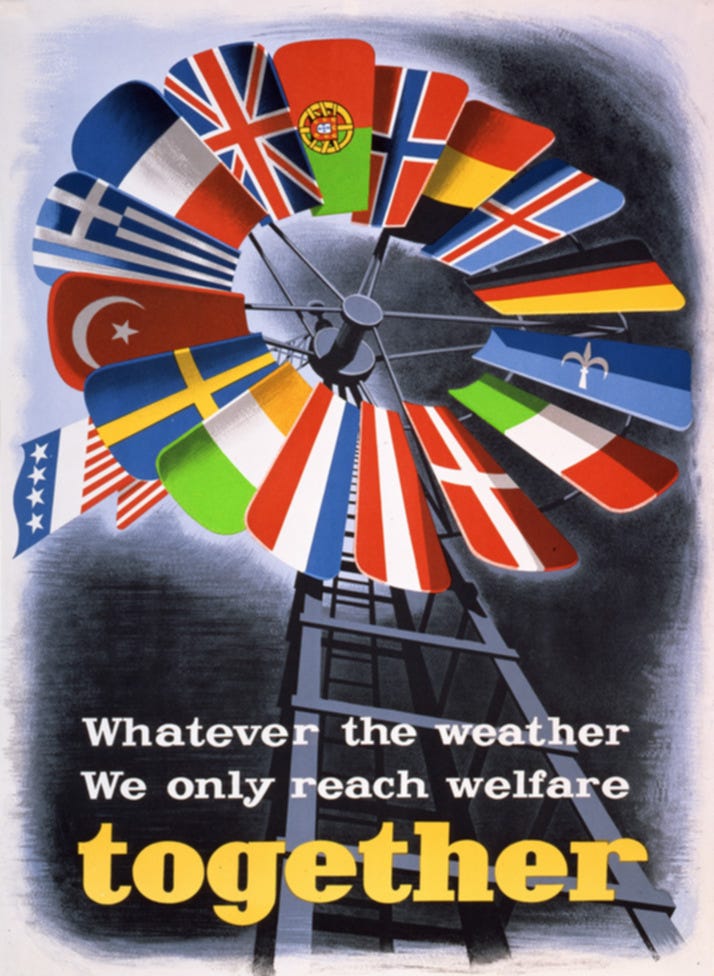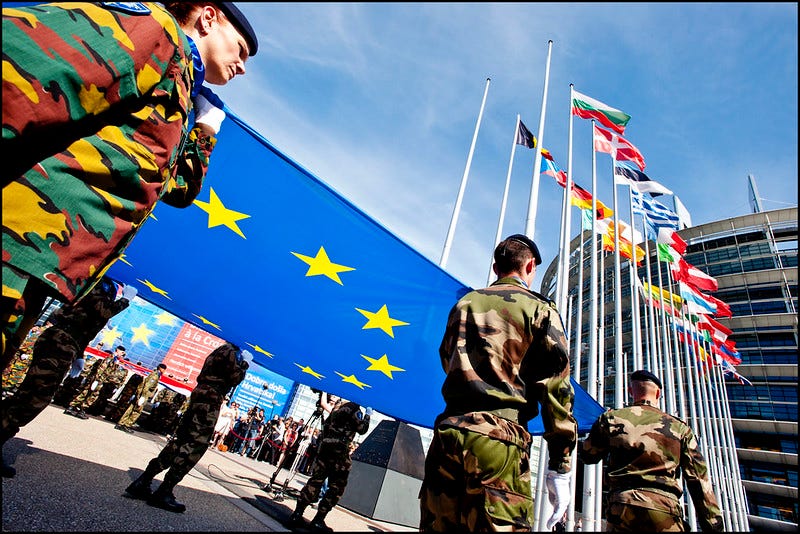An overdose of Atlanticism has put Europeans at risk
Europe's foreign policy establishment has reacted with instinctive dismissiveness to Macron’s European Sovereigntism. They fail to see how discredited their own ideology has become.
My fellow Europeans, we need to talk about America. There are some uncomfortable truths that many on this continent don’t want to hear. But wishing them away is not a strategy.
The United States is close to meltdown. At this point it’s difficult to see how it pulls back from the brink. Most likely, barring some extraordinary development, the best case scenario one can hope for in America is managed decline. It is now a very real possibility Donald Trump will again take control of the White House, through democratic means or not. Now unchecked and vengeful, he seems intent on dismantling not only America’s democratic institutions but also NATO and the Breton Woods systems the Western world has relied on. And at worse, and yes we need to say this out loud, America may very soon find itself in a state of civil war.
Europeans desperately wanted to convince themselves that Trump was an aberration. After 2020, despite everything we saw play out, I saw this continent shut its eyes and pretend the previous four years was just a bad dream. But the truth is that Trump is just a symptom of a broken country, the world’s oldest democracy creaking under the weight of institutions that were not built for this century. And few in the corridors of power in Europe want to acknowledge the dark truth of what is happening across the Atlantic.
Europe’s military dependence on the United States is well known, but the reality is even worse than most citizens know. National leaders have not been open and honest with their citizens about how reliant they are on the United States, particularly in the most dependent countries such as Germany, Italy and Belgium. Historically there have been more active duty American soldiers in Germany than there have been active duty German soldiers. If we were talking about the Roman Empire, we know what we would call such a state. But how many Germans know the extent of the American military’s continued presence in their country? And how many in Poland and the Baltics know the extent to which American troops are swarming into their territory at the moment? And more importantly, do they understand the sovereignty implications of this invitation by their governments? There are no European bases on US soil.
Giorgia Meloni, who for all her faults has a habit of stumbling upon truths other leaders are not willing to say, put it well when she told the Italian parliament in March: “Freedom has a price and if you are not able to defend yourself, someone else will do it for you - but they will not do it for free. They will impose their interests, even if they differ from yours, and I don’t think this was ever good business for anyone.”
That America imposes its interests on Europe, however, is not the most urgent concern of the moment. This has been the situation for 75 years, and during the Cold War Western Europe made the decision that surrendering some sovereignty to Washington was worth it in order to be protected from the Soviet Union. That calculation may have been useful at the time, but the Cold War ended 30 years ago. What has Europe been doing since then? They’ve been slashing defence budgets, and only deepening their military dependence on America - while at the same time lessening their economic dependence by building the European Union.
The most urgent concern at the moment is not that America is here, but that suddenly it won’t be. It now looks almost certain that Trump will be the Republican nominee for president, and polls show him neck-and-neck with Biden, with one outlier poll even putting him ten points ahead. To say Trump is hostile to Europe is an understatement. But more importantly, he has also publicly cast doubt on NATO’s mutual defence guarantee and former aides say he wants to take the US out of the alliance, which would effectively cause NATO to collapse. He and most of the Republican Party want, at the very least, to stop sending money and weapons to Ukraine. And this isn’t even close to the worst case scenario for liberal-democratic Europe.
This week’s retirement of General Mark Milley, the most senior commander of the US military, has reopened discussion of what happened in January 2021 when Milley appeared to be laying the ground work for a military counter-coup if Trump refused to leave office or ordered the military to do something dangerous. Last week Trump again called Milley a traitor who should be put to death because he contacted Beijing during this period to say he would step in if the president ordered an attack on China. What happened in January 2021, from the Capitol insurrection to the racketeering and subversion of the election result to the military readiness for a counter-coup should leave no doubt for Europeans. It is now a very real possibility that the US is going to descend into some kind of civil war, and November 2024 could be the trigger. In such a scenario, the US cannot be relied upon to protect Europe.
Last week Politico ran an article about how Europe is preparing for a possible Trump victory. The short answer: they’re not. The most frightening quote in the piece came from an unnamed European diplomat: “This is not something you can really prepare for.” This is the sentiment I hear all too often on this continent - Trump 2.0 would be a nightmare for Europe, but there’s nothing we can do so we just have to watch and see what happens. It’s as if Europe is a child suffering under an alcoholic father, and they just have to wait powerlessly hoping their father stops drinking.
Europeans watch American politics extremely closely, often more closely than they follow their own domestic politics and certainly more than they follow the politics of their neighbors or of Europe as a whole. US presidential elections are followed as if the president of Europe were being elected, and in a military sense, that is somewhat true. But this is an election that Europeans can’t vote in, almost like they were a territory of the United States like Puerto Rico or Guam. It has always baffled me why Europeans would be so content with this state of affairs. When Europeans want to complain about American politics to me, I tell them that instead of talking about the problem which they can do nothing about, let’s talk about the solution - creating a sovereign Europe where these US elections don’t matter so much to Europeans.
Three options
The problem is that Europe’s foreign policy establishment - the think-tanks, the media, and the politicians - haven’t updated their thinking to reflect the current reality of what’s happening in America. Atlanticism, the political ideology which says Europe is best served by maintaining close political, economic and defence ties to the United States for the purpose of maintaining security and prosperity, is still the dominant ideology of the chattering classes - particularly in the UK, Germany, the Nordics and Eastern Europe. For them, the war in Ukraine serves as proof that they were right all along. They believe that if Europe had lessened its dependence on America and tried to build its own capacity for sovereign military defence over the past years, they would have been left defenceless in the face of Russia’s invasion because their military capacity wouldn’t have been ready yet. And, so they say, after taking Ukraine Russia would have next turned its sights to invading EU countries. Any talk of European Sovereignty or Strategic Autonomy is to them an unhelpful distraction, a pipe dream that can’t be successful in defending Europe from Russia in the short term and therefor shouldn’t even be started.
Such attitudes are also on display in the Politico piece. MEP Jacek Saryusz-Wolski from Poland’s ruling hard-right governing party insists that Trump doesn’t really mean what he’s saying about Ukraine. “We expect the deep American state will prevail over electoral promises,” he said. The Berlin-based foreign policy analyst Ulrich Speck correctly diagnoses the problem which is that Europeans are “sleepwalking”. However in my opinion the examples he lists, which seems like a kind of both-sidesism, aren’t quite right. “We have Macron’s form of sleepwalking, which dreams of autonomy and sovereignty,” he said. “We have German sleepwalking, which is denial. And then we have British sleepwalking, which is detachment.”
While I agree that Germany is in denial, I disagree that Macron’s response is sleepwalking. Out of the three, his is the only strategy that seems awake. Far from detaching, the British are only deepening the transatlantic bond and reliance on America. The core of the Atlanticist argument against Macron’s Sovereigntism is that it cannot be done in the short term and is therefor a distraction from what Europe needs to do immediately to prepare for the possibility of a Trump presidency or an American unravelling. But after shooting down Sovereigntism, they offer no alternative other than maintaining the status quo while beefing up European defence spending. In these three examples I actually see the three options Europe has for response: Denial (Germany), more Atlanticism with more military spending (UK) or European Sovereignty (France). Yes, the latter can’t be achieved in one year. But the other two are not actions but more accurately the lack of action. They are inertia, sitting back impotently and hoping that America sorts itself out, without any effort to de-risk the relationship in the meantime.
Yes, France is an imperfect messenger to be delivering this message. Not without reason, the country is generally distrusted in Europe and the refrain you usually hear is, “In the end, France only cares about itself”. There are suspicions that what Macron really means by European Sovereigntism is actually just replacing American hegemony with French hegemony, much like France’s purported championing of multi-lingualism is really about replacing English with French as the European Union’s common working language. But however much the latter may be true, it is illogical to think that France could even aspire to military dominance of Europe. That’s 200-year-old thinking (on a continent where memories are long). Old prejudices are preventing many in the British, German, Nordic and Eastern foreign policy establishments from seeing the merit of the only real European solution to the risk of American collapse that anyone has put forward.
Europeans need to shed their biases and listen to the French, because on this they are right. “Europe must be ready to face any situation linked to the results of the US elections,” former French President François Hollande told Politico, alluding to the possibility of civil unrest of democratic collapse. “What we need to prepare for is the United States distancing itself from European affairs and the possible unraveling of the transatlantic alliance.”
But Norbert Röttgen, a senior member of the German parliament, sums up Germany’s denial in the piece. To prepare, Germany should “urgently collaborate with its European partners to develop an independent defence policy - unfortunately, I see no signs of this initiative within the government.”
Time to move on
This week, EU leaders will meet in Granada, Spain for a summit at which they’re expected to sign off on key investments into the European Defence Union, giving the EU for the first time a real military capacity. But these are baby steps, and nobody thinks this could be ready in time for the potential worst-case scenarios coming in just a little over a year.
Atlanticism may have served Europe well in years gone by, but those days are long over. However, the mindsets and institutions lived on past their expiration date. Atlanticism has been the widely-accepted driving force in Europe for so long that it seems people can’t even imagine a world without it. Its proponents warn that even questioning it is dangerous, especially in the context of the Ukraine War, which they say is proof of why their ideology is the correct one. They portray it as a zero-sum game, pretending that Sovereigntism means Europe turning its back on America when in fact it means changing the protectorate relationship into an alliance of equals - an alliance Europe would be free to leave at any point. They will tell you that it means Europe embracing China or Russia instead, apparently unable to grasp that Europe is not a child that will always need protection from someone. They will tell you that the Ukraine invasion proves that Europe was right to continue embracing Atlanticism, refusing to even contenance that an expanding American military alliance was more threatening to Russia than an expanding EU defence union ever would have been.
And they will roll their eyes as they tell you European Sovereigntism is an old French obsession going all the way back to De Gaulle that the French would be banging on about whether America was a reliable partner or not. This is perhaps the argument I find most strange. Even if there weren’t questions over the risk of American collapse or disengagement, even if there wasn’t a military threat from Russia, why wouldn’t European Sovereignty be an ideology worth embracing on its own merits? Are Europeans really content to have their fate decided by a handful of voters in Iowa? Do they not feel embarrassed when they have to surrender to Washington time and time again when European legislation threatens American interests? As Meloni said, protection doesn’t come for free. For the sake of their own dignity, would sovereignty not be a worthwhile thing for Europeans to pursue regardless of current circumstances?
If Atlanticism had been ditched or adjusted years ago, and the roof was fixed while the sun was shining, Europe would not be in the extremely vulnerable situation it finds itself in at the moment. Facing an aggressor to the East, Europe finds itself reliant on a foreign power to the West that at any moment could either collapse or have a new regime that makes a deal with Russia and throws Europe to the wolves. Europeans should think about how we got here. And they should not be repeating the same mistakes of the past two decades.









"My fellow Europeans, we need to talk about America."
*sigh* Well... if we must. You know the zeitgeist is moving fast when vieux (neo)cons like Ilves become the human embodiment of the I'M NOT OWNED!! drill meme and turn into a corn cob who insists Macron was not right, or that he was right in the wrong way. (Bad faith actors who show their whole arse on twitter do not deserve to be taken seriously, but they can be useful weathervanes.)
"And more importantly, do they understand the sovereignty implications of this invitation by their governments?"
Russia is the only threat to their sovereignity they see. Well, some also fear globohomo EU gays who will make them gay by forcing them to eat gay insects. But for most sane Eastern Europeans America Good and America Benevolent Hegemon and America Convenient and Cheap Sugar Daddy. Sane doesn't mean smart. But Germany is far from the only EU country seemingly incapable (and obviously unwilling) of producing political elites capable of thinking ahead of the next village/land election. So from their vantage point this voluntary blindness used to make sense.
"It’s as if Europe is a child suffering under an alcoholic father, and they just have to wait powerlessly hoping their father stops drinking."
Yup. And nobody likes the uncool parent who tells you you HAVE to make your bed, do your homework and brush your teeth. Especially not this guy
https://twitter.com/notesfrompoland/status/1137093145487990784?lang=es
or guys like Speck who are paid to make sure Europe doesn't dare do move on from the protectorate.
“In the end, France only cares about itself”
Which it finds easy to shrug off oh so galically because this accusation comes from GERMANY lmao or countries that have never given a single shit about anybody but themselves in the EU, who treat the EU as a cash machine and refuse to even acknowledge EU law as applying to them. Bof.
"why wouldn’t European Sovereignty be an ideology worth embracing on its own merits? Are Europeans really content to have their fate decided by a handful of voters in Iowa?"
Yes. That's the very essence of being immature and entitled. Until life comes at you fast.
One angle of this story that I feel is not getting any media coverage is that France is increasingly winning the Brexit relocation sweepstakes of American companies being forced to relocate from the UK to someplace in the EU27. Major American banks and there CEOs such as Jamie Dimon of JPMorgan and Brian Moynihan of Bank of America have spoken quite positively about the business climate of France and Macron's governance. Yet outside of some American and French publications you hear very little about this. You definitely don't see much coverage of BofA moving jobs from London to Paris in the Nordic or Eastern European press. In fact, the view of the Nordic, Baltic and Eastern European press seems to be that "economic" and "business" stories like this are frivolous and what really counts in the world is geopolitical and military hard power.
**I actually think there are a bunch of reasons including a certain degree of embarrassment that no matter how pro American Poland's government is there is simply no way that New York City based JPMorgan was going to have it's post Brexit EU headquarters in Warsaw.